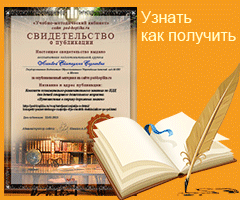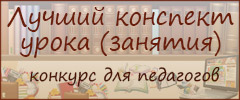Конспект урока английского языка для 9 класса по теме «Выборы: моя гражданская позиция»
Конспект урока английского языка для учащихся 9 класса по теме «Elections: my civil position» («Выборы: моя гражданская позиция»)
Автор: Соболева Людмила Ивановна, учитель немецкого и английского языков, МОУ «СОШ №13 г. Зеленокумска», Ставропольский край, г. Зеленокумск.
Описание материала: Предлагаю вам конспект урока английского языка для учащихся 9 класса по теме ««Elections: my civil position». Данный материал будет полезен учителям английского языка.
Активная гражданская позиция зарождается в пору юности. Именно поэтому урок «Elections: my civil position» актуален для учащихся 14 – 15 лет. Данный урок знакомит учащихся с понятием демократия, избирательными системами Великобритании, США и России. Главные вопросы, которые рассматриваются на данном уроке: нужно ли идти на выборы? Что на выборах и после них зависит от избирателя?
Цель урока: получение учащимися представления о демократических выборах, об избирательных системах Великобритании, США и России; понимание важности и ответственности шага, связанного с участием в выборах.
Задачи урока:
· содействовать практическому овладению различными способами деятельности (развитие устной и письменной речи, чтение аутентичного текста, расширение словарного запаса);
· отработать навык работы с правовой терминологией.
Форма проведения: урок – дискуссия.
Основные понятия: democracy, ballot, to vote, election, candidate.
Ожидаемые результаты:
· Учащиеся в ходе учебного занятия приобретут навыки работы с текстовой информацией.
· Учащиеся получат представление об избирательных системах Великобритании, США, России.
· Учащиеся могут задуматься и высказать свое отношение по вопросам значимости выборов как демократического института и важности активной гражданской позиции.
Оборудование и материалы: компьютер, проектор, экран, учебный материал (презентация) на цифровом носителе, информационные материалы, листы с заданием.
Опережающее индивидуальное домашнее задание: подготовить сообщения о политических системах в Великобритании, США, России.
Сценарий урока
1. Motivation (7 min)
Teacher: Good morning my dear friends! I am glad to see all of you today and happy to start our lesson. Today we have an unusual lesson. Look at the slide!
Read these quotes and determine which ideas incorporated in these statements
Ballot is stronger bullets.
Abraham Lincoln, the sixteenth President of the United States
I would not want to be a slave, and I will not be a slave owner. This expresses my understanding of democracy.
Abraham Lincoln, the sixteenth President of the United States
Everyone should have the courage to stand up for their beliefs.
Alexander von Humboldt, German naturalist and explorer
I believe in people. I believe in their good intentions. I believe that we are here to have a better life. And if we do it all together, then we will achieve success.
Vladimir Putin, President of Russia
Pupil 1: These statements are about elections and democracy.
Pupil 2: Sometimes people think that the right to vote does not matter.
Pupil 3: The responsibility of the voter is the foundation of democracy.
Teacher: You are right. What do you think what we are going to talk today about?
Pupils: We'll talk about the democratic elections and a responsible participation of citizens in them. We’ll discuss the role of citizens in a democracy.
2. Teaching/ Learning Procedure (15 min)
Teacher: The idea of democracy plays a great role in politics. What do you think “democracy” means?
Democracy is a form of government in which all eligible citizens have an equal say in the decisions that affect their lives. Democracy allows eligible citizens to participate equally—either directly or through elected representatives—in the proposal, development, and creation of laws. It encompasses social, economic and cultural conditions that enable the free and equal practice of political self-determination.
How does Democracy work in different countries? Your task was to prepare reports about political systems in the UK, the USA and Russia.
Pupil 4: The UK is a constitutional monarchy and a parliamentary democracy. The Monarch is the official head of state and an integral part of Parliament in her constitutional role.
Queen Elizabeth II is the head of state now but she has no real power. She gives the royal assent to the bills passed by the House of Commons and the House of Lords. The Monarch officially appoints the Prime Minister and life peers. But in appointing the Prime Minister she is not free in her choice: she must appoint no other person but the leader of the party which has the majority of seats in the House of Commons. The English are quite right saying that “the queen reigns but doesn’t rule”
Since the VIII century the power of the English monarch has been limited by Parliament. Parliament is the legislative power. The British Parliament consists of two houses: the House of Commons having 650 members and the House of Lords with approximately 1000 peers. The members of the House of Commons are elected by people every 5 years. The Chairman of the House of Commons is the speaker. The members of the House of Lords are not elected. They inherit this right from their fathers. The Chairman of this House is called Lord Chancellor. The main function of the Parliament is law-making. Each bill is introduced to the House of Commons first and has three readings. After the third reading it is taken to the House of Lords. On their approval the Queen signs it, thus it becomes the law of the country. The executive power is in the hands of the cabinet which consists of the most important ministers with the prime-minister at the head. It is chosen from the members of the leading party, called the Government party. Other parties represent the opposition.
Pupil 5: The United State of America is a presidential republic. The president is the head of state. The president is elected directly by the people and he is not a member of the Congress. The president must be at least 35 years old and be a natural citizen of the USA. He must have lived in the USA for at least 14 years and be a civilian. The president is elected every 4 years and cannot serve more than 2 terms.
Congress is the legislative branch of the federal government. It is made up of the Senate and the House of Representatives. The House has 435 members, the Senate has 100 members. Congress makes all laws and each house of Congress can introduce a new project. Each can vote against the project passed by the other. If both houses agree, the project becomes law.
Pupil 6: The Russian Federation is a presidential republic. The President is the head of state and is elected directly by the people. In fact he has much power. The President can even dissolve the Duma if it doesn’t agree with his suggestions three times running. The President has his Administration but it is not part of the Federal Government. The President is involved in the work of the legislative and executive branches.
The Federal Assembly represents the legislative branch of power. It is made up of the two houses: the Federation Council and the Duma which makes laws. The President can veto laws passed by the Federal Assembly but the Federal Assembly can pass laws over the President’s veto by a two-thirds majority.
The Federal Government represents the executive branch of power. The President appoints its head, the Chairman of the Government but the Duma must approve his appointment.
The Supreme Court represents the judicial branch of power. The Constitutional Court has the right to declare actions of the President, the Federal Assembly and the Federal Government unconstitutional.
3. Instructional Strategy (12 min)
Teacher: OK. Now, let’s continue our lesson. Do you know what it means to vote? (Take any answers that may be offered and write them on the board.)
Pupils: Voting is a chance for us to speak up, share our opinion, and have our opinion counted as one of a whole group.
Teacher: Discuss common reasons why people are not civically engaged (lack of knowledge, lack of time, not knowing what to do, feeling that they cannot make a difference, mistrust of politicians, etc.) What might be the result of civic disengagement of their generation?
Teacher: Work in pairs. This is a fun worksheet to complete (Приложение 1). First of all read the text and then use a dictionary to find out more about each of these words. Write a sentence of your own using each word.
4. Closure (10 min)
a) Discussion
Teacher: What did you learn today? What are you thinking about? What became important for you as a result of the lesson?
b) Evaluation
The teacher will interact, supervise the class discussion, and make sure that the children understand the purpose of the activity and the process of voting and why it is important to vote your own opinion. The teacher will evaluate the class by observation and reviewing worksheets.
c) Homework
Write an essay “Could You Be President?”
Teacher: Thank you all for your work today and good bye! See you the next lesson.
Использованные источники
К.И. Кауфман, М.Ю.Кауфман «Английский язык», 8 класс, издательство «Титул», 2011 год
Рекомендуем посмотреть:
Внеклассное мероприятие по английскому языку на тему: Хэллоуин, 5 класс
Конспект интегрированного урока «Английский язык и физика» в 10 классе
Информационные технологии на уроках английского языка
Конспект урока английского языка в 5 классе по теме: Праздники
Конспект урока по английскому языку для 5 класса по теме «Времена года»
| Ульяна Николаевна Кичигина # 25 ноября 2016 в 10:06 0 |
| Наталья Игоревна Костенко # 16 августа 2018 в 15:58 0 | ||
|


